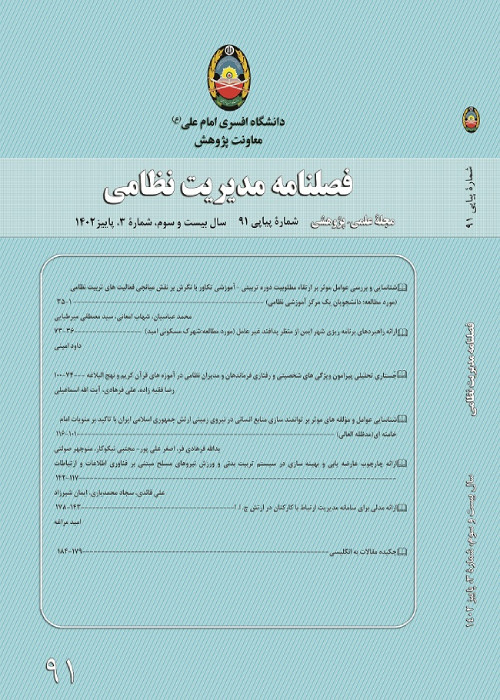فهرست مطالب
فصلنامه مدیریت نظامی
پیاپی 31 (پاییز 1387)
- تاریخ انتشار: 1387/09/04
- تعداد عناوین: 5
-
صفحه 97
-
Page 1Organizational efficiency is a great significance in the improvement of organizational performance in current management approaches. Organizational efficiency can be approached from three perspectives: Individual analysis, Group analysis and Organizational analysis. In this study organizational efficiency is approached from group analysis composed of three aspects including military knowledge, military proficiency and military sprit. Given to the methodological requirements and Parson's conceptual model, attempts are made to study impacts of hierarchical culture on organizational efficiency. Respective, descriptive and explanatory findings of the study sustain that the governing culture in Imam Ali University is hierarchical In nature; compatible with scientific and military training. The analysis data on testing the hypothesis indicate that strategies of military training improve organizational efficiency %4 and strategies of scientific training result in %2 increase in organizational efficiency. On the contrary hierarchical culture brings about %6 in organizational efficiency while provided that it is corresponded with the strategies, it will result in improvement in efficiency.Keywords: Hierarchical Culture, Organizational Efficiency, Strategies of Military, Scientific Training
-
Page 29Role of strategic Planning in the current organizations is an obvious fact. Strategic planning is defined as an organized attempt as to implementing main strategies of an organization and its application leads to fulfillment of an organization objectives. Strategic planning sets an organization's objectives given its mission and tries to identify organizational opportunities, threats, strengths and weaknesses through environmental studies so that realistic objectives can be identified and followed. Applying strategic planning to knowledge-based organizations is of critical importance due to their internal extensiveness and complexities. As a library research this study addresses strategic management in knowledge – based organizations including academic circles and its challenges.Keywords: Strategic Plan, Strategic goal setting, Challenges of goal setting, Knowledge –based Organization
-
Page 49This study attempts to investigate cognitive prejudices affecting self and other assessment. Methodologically, scientific documents were investigated based on both fields and content analysis approaches and Campel's semi-experimental research design. Participants of the study were 24 command and staff students of the Army of the J.R. of Iran, who attended a fourphase experiment in the summer of 2008 conducted in one to three weeks interval in between. The participants received both pre-test and post-test. Findings reveal the facts that our information-based judgments are not as valid as expected or as less valid as others anticipate. Such impressions originate from inevitable prejudices anchored in our unconscious mind which are almost too difficult to defeat. It is concluded that we should identify other models of analysis and apply them, be aware of mirrored pictures past-thinking and opponent-identification techniques and exercise our creative thinking.Keywords: Information Analysis, Cognitive Prejudices, Psychology of Information Analysis, Mental Orientations
-
Page 75This study first addresses nature of military profession and thoughts and beliefs governing military organizations. Following a definition of innovation and knowledge management in the military context, challenge and opportunities facing innovation and knowledge management in military organizations are also addressed. Knowledge management and its relevance to innovation particularly in military organizations accommodates another section of the study the most significant part of the study, however, is concerned with current theories of military innovation in which characteristics of each theory are elaborated and feasibility of customizing each of them given the intervening variables in the military context of the study covers issues like mechanism, for strengthening innovation and parameters of a successful innovation approach. None the less proposed approach for establishing and strengthening innovation and military knowledge management the I.R. of Iran particularly those of the army of the I.R. of Iran as the most organized military institution in Iran accommodates the core of the study in which the author has attempted to offer such an approach taking into account the characteristics of common scientific theories regarding military profession and organizations.Keywords: theories of military innovation – knowledge management – customizing
-
Page 97Given the deterministic role of military power in ensuring national security of every state and also contrary to the past, given the interactions among economic, social, cultural, political and military aspects in the parameters of national power that causes national and defense power constancy of that country. military power and military security might have lost its traditional significance compared to other aspects of security such as economic, political and social security or considering significance it has been placed in other lines of national power aspects. While the importance of military power due to recent international developments and intelligence wars of late twenty and early twenty first centuries have made security receive its previous significance. The claim made above is justified on the ground that in recent years, military means has been the most resorted mechanism in the foreign policy of great powers against each other or against other state in the world. On the other hand, due to the structural and functional deficiency of the United Nations and harmony of this international organization with great powers, have turned military power mainly a legitimate means to be utilized by invaders to impose pressure, violence and their wills on weaker countries. Consequently, weaker states try to excessively invest a significant proportion of their own GNP in military budget so as to protect their own territorial integrity, independence and vital values, given the perspectives of authorities and main determinants of state and their impressions of threat and the effect of international, regional and local environment on their evaluations. In this study attempts are made to elaborate the definitions of national power, national security, military power and its parameters in structural dimensions, quantity and quality of human resources, power of military leadership, weaponry system, military infrastructures, capability of mobilizing reserve units, policy of defensive security, creating bonds and harmony between people and military forces, defense budget, etc are explained and conventional military power appropriate for a state is accounted for.Keywords: National Power, National Security, Military Power, Parameters of Military Power


